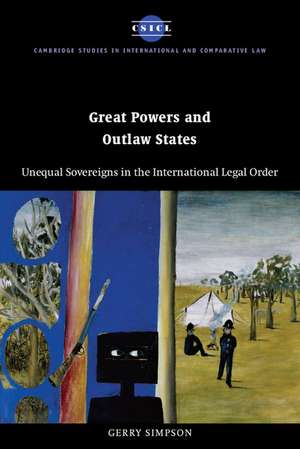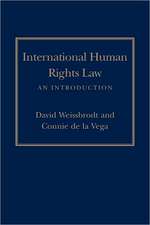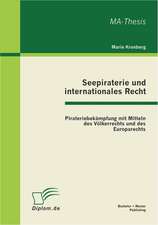Great Powers and Outlaw States: Unequal Sovereigns in the International Legal Order: Cambridge Studies in International and Comparative Law, cartea 32
Autor Gerry Simpsonen Limba Engleză Paperback – 21 apr 2004
| Toate formatele și edițiile | Preț | Express |
|---|---|---|
| Paperback (1) | 328.44 lei 6-8 săpt. | |
| Cambridge University Press – 21 apr 2004 | 328.44 lei 6-8 săpt. | |
| Hardback (1) | 825.74 lei 6-8 săpt. | |
| Cambridge University Press – 21 apr 2004 | 825.74 lei 6-8 săpt. |
Din seria Cambridge Studies in International and Comparative Law
-
 Preț: 233.37 lei
Preț: 233.37 lei - 9%
 Preț: 661.94 lei
Preț: 661.94 lei -
 Preț: 200.33 lei
Preț: 200.33 lei -
 Preț: 201.39 lei
Preț: 201.39 lei -
 Preț: 176.91 lei
Preț: 176.91 lei -
 Preț: 231.74 lei
Preț: 231.74 lei - 9%
 Preț: 661.90 lei
Preț: 661.90 lei -
 Preț: 230.94 lei
Preț: 230.94 lei - 9%
 Preț: 731.44 lei
Preț: 731.44 lei - 9%
 Preț: 1013.73 lei
Preț: 1013.73 lei - 9%
 Preț: 765.90 lei
Preț: 765.90 lei -
 Preț: 237.53 lei
Preț: 237.53 lei - 9%
 Preț: 773.84 lei
Preț: 773.84 lei -
 Preț: 329.28 lei
Preț: 329.28 lei - 14%
 Preț: 793.62 lei
Preț: 793.62 lei -
 Preț: 238.11 lei
Preț: 238.11 lei - 9%
 Preț: 596.72 lei
Preț: 596.72 lei - 9%
 Preț: 593.36 lei
Preț: 593.36 lei -
 Preț: 209.39 lei
Preț: 209.39 lei - 9%
 Preț: 917.65 lei
Preț: 917.65 lei -
 Preț: 239.72 lei
Preț: 239.72 lei -
 Preț: 238.11 lei
Preț: 238.11 lei - 11%
 Preț: 639.92 lei
Preț: 639.92 lei -
 Preț: 350.03 lei
Preț: 350.03 lei - 14%
 Preț: 784.65 lei
Preț: 784.65 lei -
 Preț: 310.86 lei
Preț: 310.86 lei - 14%
 Preț: 731.56 lei
Preț: 731.56 lei - 14%
 Preț: 698.80 lei
Preț: 698.80 lei - 14%
 Preț: 896.01 lei
Preț: 896.01 lei -
 Preț: 288.04 lei
Preț: 288.04 lei - 14%
 Preț: 757.69 lei
Preț: 757.69 lei - 14%
 Preț: 721.96 lei
Preț: 721.96 lei -
 Preț: 284.78 lei
Preț: 284.78 lei - 11%
 Preț: 642.00 lei
Preț: 642.00 lei - 14%
 Preț: 700.76 lei
Preț: 700.76 lei -
 Preț: 358.28 lei
Preț: 358.28 lei - 9%
 Preț: 662.73 lei
Preț: 662.73 lei - 14%
 Preț: 703.42 lei
Preț: 703.42 lei -
 Preț: 363.28 lei
Preț: 363.28 lei -
 Preț: 464.33 lei
Preț: 464.33 lei -
 Preț: 324.79 lei
Preț: 324.79 lei
Preț: 328.44 lei
Nou
Puncte Express: 493
Preț estimativ în valută:
62.85€ • 65.84$ • 52.09£
62.85€ • 65.84$ • 52.09£
Carte tipărită la comandă
Livrare economică 09-23 aprilie
Preluare comenzi: 021 569.72.76
Specificații
ISBN-13: 9780521534901
ISBN-10: 0521534909
Pagini: 416
Dimensiuni: 153 x 228 x 26 mm
Greutate: 0.67 kg
Editura: Cambridge University Press
Colecția Cambridge University Press
Seria Cambridge Studies in International and Comparative Law
Locul publicării:Cambridge, United Kingdom
ISBN-10: 0521534909
Pagini: 416
Dimensiuni: 153 x 228 x 26 mm
Greutate: 0.67 kg
Editura: Cambridge University Press
Colecția Cambridge University Press
Seria Cambridge Studies in International and Comparative Law
Locul publicării:Cambridge, United Kingdom
Cuprins
Foreword Professor James Crawford; Preface; Acknowledgements; Part I. Introduction: 1. Great powers and outlaw states; Part II. Concepts: 2. Sovereign equalities; 3. Legalised hierarchies; Part III. Histories: Great Powers: 4. Legalised hegemony: Vienna to The Hague 1815–1906; 5. 'Extreme equality': rupture at The Hague 1907; 6. The great powers, sovereign equality and the making of the UN charter: San Francisco 1945; 7. Holy alliances: Verona 1818 and Kosovo 1999; Part IV. Histories: Outlaw States: 8. Unequal sovereigns 1815–1839; 9. Peace-loving nations: 1945; 10. Outlaw states: 1999; Part V. Conclusion: 11. Arguing about Afghanistan: great powers and outlaw states redux; 12. The puzzle of sovereignty.
Recenzii
'In this important new volume, Gerry Simpson elegantly demonstrates the relationship between law and politics … Simpson makes an important contribution to both fields … this is an important work that takes our understanding of the politics and law of sovereignty to a new level. It neatly combines theoretical and historical analysis and provides a new set of concepts that are sure to become a key part of the lexicon of sovereignty in both international relations and international law.' Alex J. Bellamy, International Affairs
'Simpson develops a credible and subtle explanation of the severe difficulties inherent in sovereign equality …' Political Science Quarterly
'Simpson's aim, to reclaim for legal discussion subjects often appropriated by the political sciences, is an important one. He presents his case with wit and flair, and much of the historical analysis would be of interest to the general reader as well as to international lawyers.' The Cambridge Law Journal
'Simpsons book challenges some of our most basic notions about international law in the past and present. The concepts of legalised hegemony and anti-pluralism, as well as Simpson's threefold understanding of sovereign equality are the prime tools for any historical study on the international legal order in the past three to four centuries. By focusing on the elements of hierarchy and exclusiveness within the international order, Simpson fills the blank spot on the map of international law and its history. This book can be recommended to all scholars with an interest in the history of international modern law.' Cambridge Studies in International and Comparative Law
'It is a brilliant work of theory of international law … Simpson's book is an important one. It challenges some of our most basic notions about international law in the past and the present. The concepts of legalised hegemony and anti-pluralism, as well as Simpson's threefold understanding of sovereign equality are prime tools for any historical study on the international legal order in the past three to four centuries. By focusing on the elements of hierarchy and exclusiveness within the international order, Simpson fills in a blank spot on the map of international law and its history. … can be recommended to all scholars with an interest in the history of modern international law.' Journal of the History of International Law
'The book contains refreshing and sometimes provoking thoughts and it is of interest for students and scholars well beyond the circle of international law.' Journal of Peace Research
'Simpson develops a credible and subtle explanation of the severe difficulties inherent in sovereign equality …' Political Science Quarterly
'Simpson's aim, to reclaim for legal discussion subjects often appropriated by the political sciences, is an important one. He presents his case with wit and flair, and much of the historical analysis would be of interest to the general reader as well as to international lawyers.' The Cambridge Law Journal
'Simpsons book challenges some of our most basic notions about international law in the past and present. The concepts of legalised hegemony and anti-pluralism, as well as Simpson's threefold understanding of sovereign equality are the prime tools for any historical study on the international legal order in the past three to four centuries. By focusing on the elements of hierarchy and exclusiveness within the international order, Simpson fills the blank spot on the map of international law and its history. This book can be recommended to all scholars with an interest in the history of international modern law.' Cambridge Studies in International and Comparative Law
'It is a brilliant work of theory of international law … Simpson's book is an important one. It challenges some of our most basic notions about international law in the past and the present. The concepts of legalised hegemony and anti-pluralism, as well as Simpson's threefold understanding of sovereign equality are prime tools for any historical study on the international legal order in the past three to four centuries. By focusing on the elements of hierarchy and exclusiveness within the international order, Simpson fills in a blank spot on the map of international law and its history. … can be recommended to all scholars with an interest in the history of modern international law.' Journal of the History of International Law
'The book contains refreshing and sometimes provoking thoughts and it is of interest for students and scholars well beyond the circle of international law.' Journal of Peace Research
Notă biografică
Descriere
Historical and legal analysis of Kosovo and Afghanistan wars and impact on global political order.





